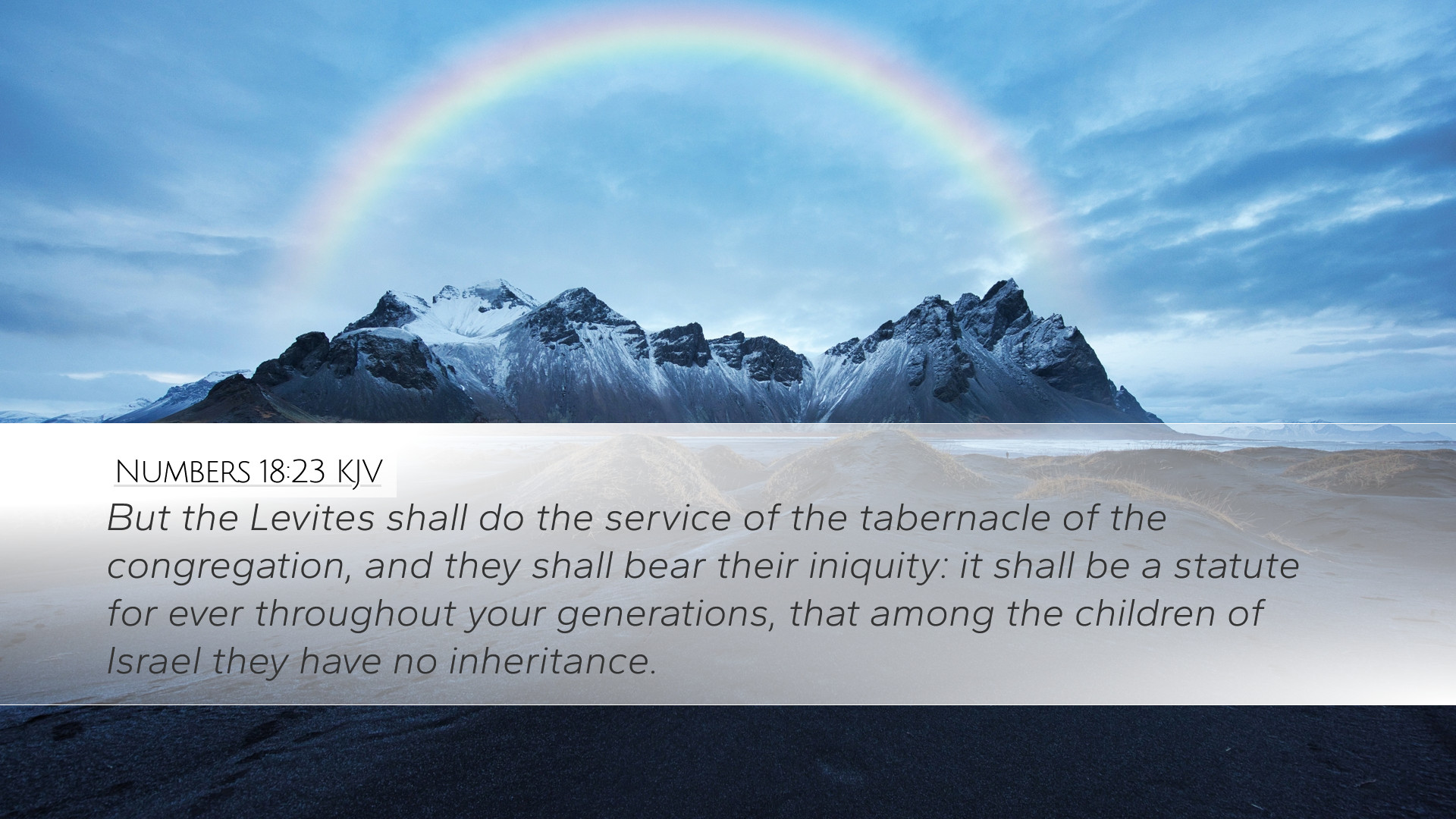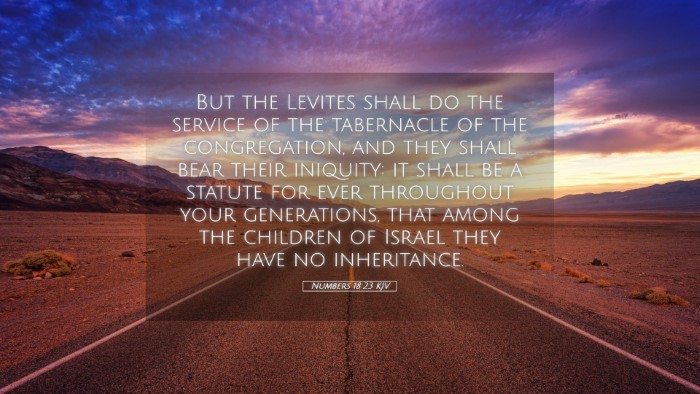Commentary on Numbers 18:23
Verse Context: Numbers 18:23 states, "But the Levites shall do the service of the tabernacle of the congregation, and they shall bear their iniquity: it shall be a statute forever throughout your generations, that among the children of Israel they have no inheritance."
Overview
This passage encapsulates the role and responsibility of the Levites within the Israelite community, highlighting their unique position in relation to both the tabernacle service and the broader congregation of Israel. It underscores God's ordained structure for religious and civil affairs among His people.
The Levites' Role
Matthew Henry elaborates on the significance of the Levites being dedicated to the service of the tabernacle, noting that this establishes a clear distinction between their spiritual responsibilities and other tribes. He emphasizes that their devotion to God facilitates the worship of the entire nation, indicating that while they do not possess land as an inheritance, their service compensates for their lack. This points to a divine economy where spiritual responsibilities often supersede material gain.
Albert Barnes adds that this arrangement highlights the consecration of the Levites as a people set apart for God’s service. Their work is crucial as mediators between God and the Israelites, meaning that they bear a unique spiritual burden. This bears a reflection on church leaders today who serve in similar capacities, suggesting that they too carry the weight of their congregation’s spiritual well-being.
Adam Clarke notes the long-term implications of this ordinance, underscoring the phrase “a statute forever.” This indicates a firm and abiding commitment from God regarding the Levites’ role. He suggests that their continued existence as a distinct group amid the Israelites signifies the ongoing need for dedicated service in spiritual matters, an important principle for maintaining the sanctity of worship across generations.
The Concept of Inheritance
Matthew Henry points out that while the Levites lack a physical inheritance among the tribes of Israel, they are granted a spiritual inheritance through their service. This paradox illustrates that earthly wealth is not necessarily indicative of divine blessing; rather, the closeness to God and the fulfillment of His purposes are what truly matter. Their physical sustenance is provided through the offerings of the people which, through this arrangement, ensures that God’s work among His people continues uninterrupted.
Albert Barnes emphasizes that this divine arrangement enables the Levites to fully focus on their sacred duties without the distractions that come with land ownership. It presents a theological framework where the spiritual supersedes the material—a concept critical for modern-day ministry, where distractions can lead leaders away from effective service.
Adam Clarke highlights the necessary relationship between inheritance and responsibility. The Levites, while not inheriting land, inherited the presence of God among them. This serves as a profound theological insight into the nature of ministry and servitude. Their security comes not from earthly holdings but from their devotion, agility in service, and continual reliance on God’s provision.
Cultural and Historical Implications
Matthew Henry discusses the historical context wherein the Levites' role was especially pertinent during the wilderness wanderings. As mobile units of worship, they serve as the spiritual backbone for the fluctuating Israelite community dynamic. Their unique function ensured that despite the lack of a permanent temple, a system of consistent worship and sacrifice was maintained.
Albert Barnes relates the lasting significance of this arrangement to contemporary church structures, suggesting that the Levite's role foreshadows the institution of priesthood in the New Testament, where Christ as High Priest fulfills and transcends the Levitical order. The permanence of their calling accentuates the concept of ordered service in God’s Kingdom, which should inspire leaders in today’s ecclesiastical settings.
Adam Clarke further delves into the cultural implications, pointing out that the Levites’ reliance on the community for support puts a communal responsibility on the congregation. This emphasizes the synergy between laypersons and clergy, as both are essential members of the Body of Christ and must work collaboratively towards spiritual nourishment and community cohesion.
Theological Reflections
This text allows for profound theological reflection. First, it invites contemporary faith communities to ponder what it means to be set apart for God’s service in a culture that often values individualism and material success. The Levites demonstrate a counter-cultural commitment that challenges believers to prioritize their spiritual duties and relationships.
Furthermore, the idea of bearing "iniquity" suggests an essential element of sacrificial leadership. Like the Levites, spiritual leaders today are called to bear the burdens of their communities. This points toward a Christological interpretation, wherein Christ, the ultimate mediator, bears the sins of many while interceding on behalf of humanity, thus providing a lens through which pastors and ministry leaders can understand their role within the larger narrative of salvation.
Finally, the enduring nature of this statute provides a reminder of God's covenant faithfulness. Just as the Levites maintained their duties throughout generations, God's promises remain steadfast. This echoes in the life of believers who are assured of God's provision, despite present circumstances. It reinforces the timeless truth that in God’s economy, faithfulness in service carries eternal value.
Conclusion
Numbers 18:23 compels us to explore the themes of service, provision, and the unique privileges of a life dedicated to God's purposes. The insights from public domain commentaries remind us to appreciate the Levites’ role both historically and theologically. For pastors, students, theologians, and Bible scholars, this passage calls for an understanding of one’s responsibilities in the light of divine order, the sacrificial nature of ministry, and the faithful provision of God amidst spiritual service.


